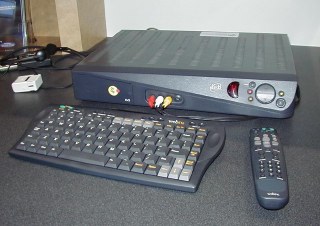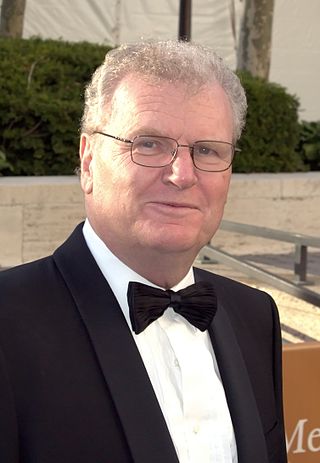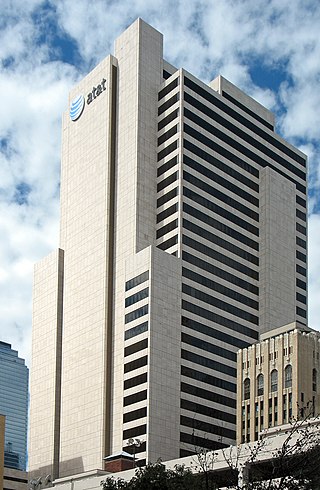
A Regional Bell Operating Company (RBOC) was a corporate entity created as result of the antitrust lawsuit by the U.S. Department of Justice against the American Telephone and Telegraph Company (AT&T) in 1974 and settled in the Modification of Final Judgment on January 8, 1982.
Video on demand (VOD) is a media distribution system that allows users to access videos, television shows and films digitally on request. These multimedia are accessed without a traditional video playback device and a typical static broadcasting schedule, which was popular under traditional broadcast programming, instead involving newer modes of content consumption that have risen as Internet and IPTV technologies have become prominent, and culminated in the arrival of VOD and over-the-top (OTT) media services on televisions and personal computers.

MSN TV was a web access product consisting of a thin client device that used a television for display, and the online service that supported it. The original WebTV device design and service were developed by WebTV Networks, Inc., a company started in 1995. The WebTV product was announced in July 1996 and later released on September 18, 1996. In April 1997, the company was purchased by Microsoft Corporation and in July 2001, was rebranded to MSN TV and absorbed into MSN.

Multichannel multipoint distribution service (MMDS), formerly known as broadband radio service (BRS) and also known as wireless cable, is a wireless telecommunications technology, used for general-purpose broadband networking or, more commonly, as an alternative method of cable television programming reception.

NYNEX Corporation was an American telephone company that served five states of New England as well as most of the state of New York from January 1, 1984 to August 14, 1997.

Internet Protocol television (IPTV), also called TV over broadband, is the service delivery of television over Internet Protocol (IP) networks. Usually sold and run by a telecom provider, it consists of broadcast live television that is streamed over the Internet (multicast) — in contrast to delivery through traditional terrestrial, satellite, and cable transmission formats — as well as video on demand services for watching or replaying content (unicast).

Tele-Communications, Inc. (TCI) was a cable television provider in the United States, and for most of its history was controlled by Bob Magness and John Malone.

Sir Howard Stringer is a Welsh-American businessman. He had a 30-year career at CBS, culminating in him serving as the president of CBS News from 1986 to 1988, then president of CBS from 1988 to 1995. He served as chairman of the board, chairman, president and CEO of Sony Corporation from 2005 to 2012. He is also the head of the board of trustees of the American Film Institute and now serves as a non-executive director of the BBC. He was knighted in 1999.

The monopoly position of the Bell System in the U.S. was ended on January 8, 1982, by a consent decree providing that AT&T Corporation would, as had been initially proposed by AT&T, relinquish control of the Bell Operating Companies, which had provided local telephone service in the United States. AT&T would continue to be a provider of long-distance service, while the now-independent Regional Bell Operating Companies (RBOCs), nicknamed the "Baby Bells", would provide local service, and would no longer be directly supplied with equipment from AT&T subsidiary Western Electric.

AirTouch Communications was an American wireless telephone service provider, created as a spin-off of Pacific Telesis on April 1, 1994. Its headquarters were located in the One California building in the Financial District of San Francisco, California. After a series of mergers, the company's vestiges are now part of Verizon.
The Technology and Engineering Emmy Awards, or Technology and Engineering Emmys, are one of two sets of Emmy Awards that are presented for outstanding achievement in engineering development in the television industry. The Technology and Engineering Emmy Awards are presented by the National Academy of Television Arts and Sciences (NATAS), while the separate Primetime Engineering Emmy Awards are given by its sister organization the Academy of Television Arts & Sciences (ATAS).

DirecTV, LLC is an American multichannel video programming distributor based in El Segundo, California. Originally launched on June 17, 1994, its primary service is a digital satellite service serving the United States. It also provides traditional linear television service delivered by IP through its U-verse TV brand and a virtual multichannel video programming distributor service through its DirecTV Stream brand. Its primary competitors are Dish Network, traditional cable television providers, IP-based television services, and other over-the-top video services.

Mediaroom is a collection of software for operators to deliver IPTV (IPTV) subscription services, including content-protected, live, digital video recorder, video on demand, multiscreen, and applications. These services can be delivered via a range of devices inside and outside customers' homes, including wired and Wi-Fi set top boxes, PCs, tablets, smartphones and other connected devices – over both the operator's managed IP networks as well as "over the top" (OTT) or unmanaged networks.
Xumo, LLC is an American internet television and consumer electronics company. It is a joint venture of Charter Communications and Comcast that operates the free ad-supported streaming television (FAST) and advertising video on demand (AVOD) service Xumo Play, and distributes Xumo Stream Box digital media players and Xumo TV smart TVs. The Xumo Play platform's service operations are based in the Orange County suburb of Irvine, California. As of October 2020, Xumo Play has 24 million monthly active users.

AT&T Inc. is an American multinational telecommunications holding company headquartered at Whitacre Tower in Downtown Dallas, Texas. It is the world's third-largest telecommunications company by revenue and the second-largest wireless carrier in the United States behind Verizon but ahead of T-Mobile. As of 2023, AT&T was ranked 13th on the Fortune 500 rankings of the largest United States corporations, with revenues of $122.4 billion.

Simeon Japhet Asher is an English film and television producer, writer and director who has worked in the United States for most of his career. Having moved back to England, he was the executive producer for interactive at CBBC, the BBC's programming strand for children, and an executive producer of the live action comedy Big Babies broadcast by that network.
The history of AT&T dates back to the invention of the telephone. The Bell Telephone Company was established in 1877 by Alexander Graham Bell, who obtained the first US patent for the telephone, and his father-in-law, Gardiner Greene Hubbard. Bell and Hubbard also established American Telephone and Telegraph Company in 1885, which acquired the Bell Telephone Company and became the primary telephone company in the United States. This company maintained an effective monopoly on local telephone service in the United States until anti-trust regulators agreed to allow AT&T to retain Western Electric and enter general trades computer manufacture and sales in return for its offer to split the Bell System by divesting itself of ownership of the Bell Operating Companies in 1982.
The 58th Technology and Engineering Emmy Awards was held on January 8, 2007. The National Television Academy announced the winners at The Venetian Hotel in Las Vegas. DIRECTV's Eddy Hartenstein received the Lifetime Achievement Award for his role in the company's becoming a global provider of digital television.

DirecTV Stream is a family of streaming multichannel television services offered in the United States by DirecTV.

AT&T Internet is an AT&T brand of broadband internet service. Previously, AT&T Internet was branded as U-verse Internet and bundled with U-verse TV, which was spun off into the newly independent DirecTV in 2021. AT&T Internet plans powered by fiber-optic cable use the AT&T Fiber brand.












